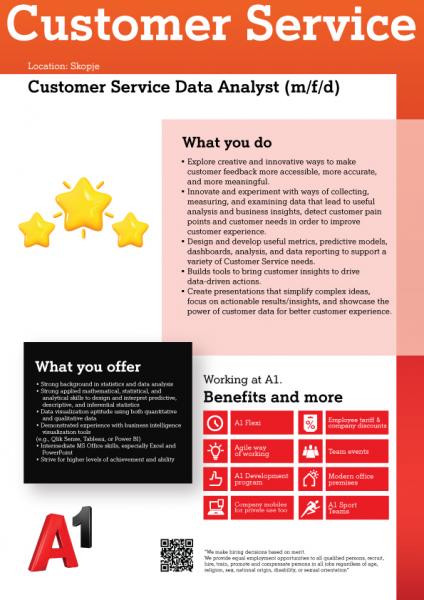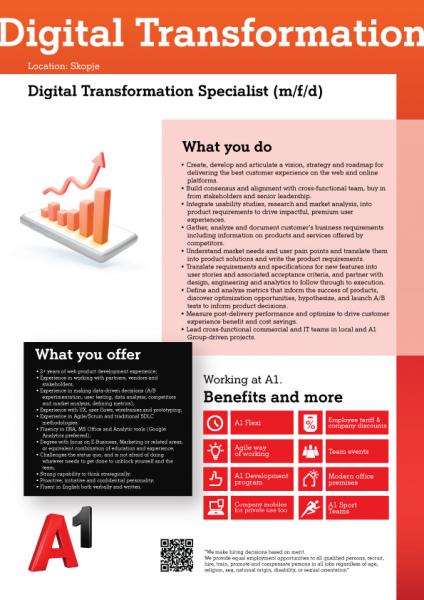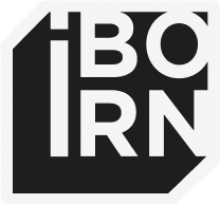Во BI&DWH има седум отворени позиции:
Data Analyst
What you do
Producing reports using data collected from different databases
Data analysis and troubleshooting
Analyzing requests from other business units and translating them into coherent and easily presentable reports
Create dashboards that consolidate and organize business KPIs that are informative, intuitive, and actionable using modern visualization tools
Reviewing and validating data quality
What you offer
Strong analytical skills to help collect, measure, organize and analyze data
SQL knowledge
Knowledge of data visualization tools (like Microsoft Power BI)
Knowledge of Data Warehouse, databases and ETL processes
Self – Starter
Curious and forward-looking
Agile and responsive
An understanding of the ethics of gathering and working with sensitive or confidential data
DWH Developer
What you do
Thorough understanding of Data warehousing concepts
Develop, improve, test and integrate ETL Data Warehouse and Business Intelligence Solutions
Building dimensional models based on user requirements
Identifying data sources and working with source system team and data analysts to define data target solutions
End to end responsibility for specification and implementation for various areas in DWH model for tel-co industry
What you offer
University Degree - IT, mathematics, telecommunications or similar
Relevant working experience in DWH/BI environment
Good knowledge in writing complex queries in SQL
Understanding of Data Models: Conceptual, Logical, and Physical & Dimensional/Relational Data Model Design.
Proficient in ETL development tools for Teradata (Fast Load, BTEQ, Fast Export)
Data Engineer
What you do
Design, create and maintain data architectures that enable data extraction and transformation for predictive modeling
Design, implement, test, deploy, and maintain batch and stream data processing solutions
Build the infrastructure required for optimal extraction, transformation, and loading of data from a wide variety of data sources
Build cloud, scalable, real time, and high-performance data lake solutions using Azure stack
Maintain data dictionary documentation on ML datasets
Create data tools for analytics and data scientist team members
What you offer
Degree in Computer Science or related fields
Advanced SQL proficiency
Knowledge of scripting languages (e.g. python, bassh, shell)
Experience building and optimizing data pipelines, architectures and datasets
Experience with cloud platforms (MS Azure, AWS, Google Cloud)
Experience with data pipeline and workflow management tools (e.g. Data Factory, Informatica, SSIS, Pentaho…)
Design and development of ETL/ELT workflows
Familiarity with source control tools (e.g. Gitlab, Github, Bitbucket) and CI/CD process
Strong problem-solving skills
Plus points:
Knowledge of Azure services- Synapse, Data Factory, AML Studio, Azure Data Lake, Azure Databricks
Hands-on experience on big data frameworks like Spark, Kafka
Experience working on real-time data and streaming applications
Knowledge of python and python data packages (e.g. numpy, pandas…)
Machine learning concepts
Customer Service Data Analyst
What you do
Explore creative and innovative ways to make customer feedback more accessible, more accurate, and more meaningful.
Innovate and experiment with ways of collecting, measuring, and examining data that lead to useful analysis and business insights, detect customer pain points and customer needs to improve customer experience.
Design and develop useful metrics, predictive models, dashboards, analysis, and data reporting to support a variety of Customer Service needs.
Builds tools to bring customer insights to drive data-driven actions.
Create presentations that simplify complex ideas, focus on actionable results/insights, and showcase the power of customer data for better customer experience.
What you offer
Strong background in statistics and data analysis
Strong applied mathematical, statistical, and analytical skills to design and interpret predictive, descriptive, and inferential statistics
Data visualization aptitude using both quantitative and qualitative data
Demonstrated experience with business intelligence visualization tools
(e.g., Qlik Sense, Tableau, or Power BI)
Intermediate MS Office skills, especially Excel and PowerPoint
Strive for higher levels of achievement and ability
Digital Transformation Specialist
What you do
Create, develop and articulate a vision, strategy and roadmap for delivering the best customer experience on the web and online platforms.
Build consensus and alignment with cross-functional team, buy in from stakeholders and senior leadership.
Integrate usability studies, research and market analysis, into product requirements to drive impactful, premium user experiences.
Gather, analyze and document customer’s business requirements including information on products and services offered by competitors.
Understand market needs and user pain points and translate them into product solutions and write the product requirements.
Translate requirements and specifications for new features into user stories and associated acceptance criteria, and partner with design, engineering and analytics to follow through to execution.
Define and analyze metrics that inform the success of products, discover optimization opportunities, hypothesize, and launch A/B tests to inform product decisions.
Measure post-delivery performance and optimize to drive customer experience benefit and cost savings.
Lead cross-functional commercial and IT teams in local and A1 Group-driven projects.
What you offer
2+ years of web product development experience;
Experience in working with partners, vendors and stakeholders;
Experience in making data-driven decisions (A/B experimentation, user testing, data analysis, competitors and market analysis, defining metrics);
Experience with UX, user flows, wireframes and prototyping;
Experience in Agile/Scrum and traditional SDLC methodologies;
Fluency in JIRA, MS Office and Analytic tools (Google Analytics preferred);
Degree with focus on E-Business, Marketing or related areas, or equivalent combination of education and experience;
Challenges the status quo, and is not afraid of doing whatever needs to get done to unblock yourself and the team;
Strong capability to think strategically;
Proactive, initiative and confidential personality;
Fluent in English both verbally and written.
Video Service Engineer
What you do
Participate in the process of development and operations of video platforms (Cable, Terrestrial, IPTV, OTT, etc)
Take part in implementation and testing process of Set Top Box (STB) devices and Smart TV/OTT applications.
Hold a Standby duty (on-call) according to a rotation schedule with other colleagues from the unit.
Prepare technical reports and perform analysis of statistical report on video service related KPI-s.
What you offer
University degree in Engineering/Computer Science disciplines.
Experience with good system engineering practices and vendor engagement.
A working knowledge and experience with some of the following technologies would be an asset:
Digital video system solutions (Cable, Terrestrial, IPTV, OTT, etc.)
Working knowledge with video/audio compression formats
Video processing equipment
Basic Linux & Unix operating system knowledge
Content protection (CAS/DRM)
Basic IP network knowledge (unicast and multicast)
Video Services Intern
What you do
Assist with video equipment installation & configuration
Assist with channels reception & processing
Assist with test of latest software builds of STB
Assist with test of new application versions for OTT & Smart TV/Android TV
Track and report data from service quality monitoring platforms
What you offer
Current enrollment in a bachelor’s degree program
Prior internship experience is a plus but not required
Experience using Linux & IP networks is a plus but not required
Strong desire to learn along with professional drive
Passion for the telecommunication industry and its best practices













